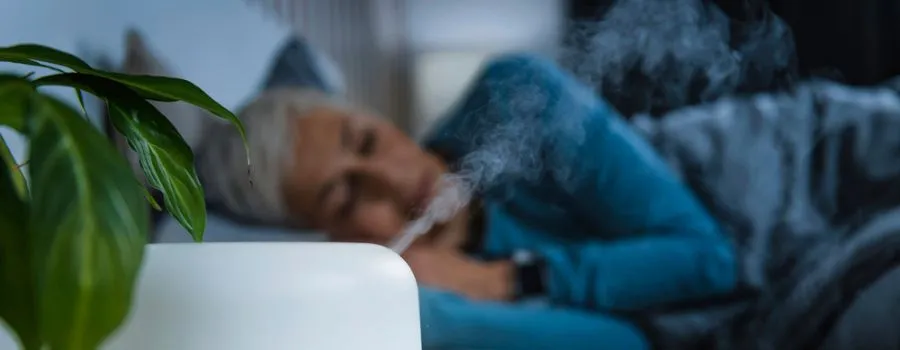The average human spends 1/3 of their life sleeping, and since the place we will most likely be sleeping in is our bedroom, we must keep it optimal for sleep. Well, one main factor that can affect your sleeping experience in your bedroom is the humidity level, and most people tend to overlook this; which is why in this post, we will take a deep dive to give you tips on how you can achieve the best humidity level for sleeping to alleviate you from any uncomfortable sleeping experience in the bedroom.
Table of Contents
Humidity and Sleep: What's The Relationship?
Humidity is the level of moisture in the air, as stated earlier, both high and low humidity levels can be detrimental to our health; therefore, we must optimize our indoor temperature to the ideal room humidity level for good health.
So, what we will do in this section is highlight how high and low humidity levels can affect our sleep.
How High Humidity Affects Your Sleep:
High humidity levels mean the air in your bedroom is filled with so much water vapor to the extent that the air cannot accommodate any more water vapor. This situation can affect us in two ways depending on the season we are in; whether winter or summer.
1.It Makes The Room Uncomfortable To Sleep in:
In summer, when humidity levels are high in your room, you will notice that you tend to sweat a lot while you sleep, which can be very uncomfortable. This is because since the air in your room is saturated, it is reluctant to take in more moisture, and as a result, sweat from the body cannot vaporize faster, making it difficult for your body to cool off which leads to night sweats.
Even though it is less likely, your room can be humid during the winter, and when this happens, it can affect your health as well. When your room is humid during the winter, your body will not be able to expel heat in the form of sweat, as a result, you will tend to feel frosty at night, making you restless throughout the night.
2.High Humidity Affects Your Sleep Cycle
When we sleep, our body goes through 4 different phases, these phases include, N1, N2, N3, and REM. N1, N2, and N3, are referred to as the non-rapid eye movement (NREM) stage, and this stage gradually progresses from light sleep (N1) to Restful sleep (N2), and Deep sleep (N3). And what happens during this stage is that the body begins to cool down, the breathing rate drops and the body’s restorative process begins. It is important to note that stage 4 (REM) is the stage where you dream, and memory consolidation happens. We will like to highlight that the body goes through all these 4 phases within 90 minutes and repeats them until you are awake.
So, what has this got to do with high humidity?
Well, when humidity levels are high in our bedrooms, the body finds it difficult to reduce its temperature while we sleep, and this can affect the body’s ability to fully execute each phase of the sleep cycle. And when the phases of the sleep cycle are shortened, we tend to experience, emotional distress, memory degradation, increased stress, reduced productivity, and many more.
This is why you need to regulate your humidity levels in your bedroom.
3.Exercebated Health Concerns
Besides affecting making us relentless during our sleep, high indoor humidity levels tend to affect our health. As stated earlier, when we sleep, our body temperature drops and we tend to breathe a bit slower than normal. Well, sleeping in a highly humid room can exacerbate health conditions, especially, respiratory conditions.
This is because humid air tends to be lighter than dry air, therefore, it becomes harder to breathe in humid conditions than in dry air conditions, and when this happens, it can exacerbate cases of asthma while asleep or while in the room.
Also, the difficulty in breathing can put pressure on the heart since there will be a shortage of oxygenated blood to be pumped, and the heart will have to work more, and this can also exacerbate cases of high blood pressure.
How Low Humidity Affects Your Sleep:
Low humidity levels can also be detrimental to our sleep and health in many ways; some of which include:
1.Skin Issues
When humidity levels are low, the skin is forced to give up its moisture to the environment. Therefore, when our bedrooms are less humid and we sleep there, we tend to wake up with dry skin complemented by chapped lips.
2.Exercebated Respiratory Conditions
One key area of our health that can get affected by low humidity levels is our respiratory system, even more so than high humid conditions. When humidity levels are low, the mucus in our respiratory system tends to dry out, again, this is because the body is losing its moisture to the environment.
The mucus is an essential element of our respiratory system since it prevents bacteria and allergens from entering our body, and it also moistens the air to prevent it from damaging the lungs. So, when we sleep in our bedroom when it is less humid, we tend to put ourselves at a high risk of experiencing, nasal blockage, bleeding nose, cold and flu from the allergens, aggravated asthma, and chronic bronchitis.
These conditions can make it difficult for us to sleep, which in turn affects our overall health.
Ideal Humidity For Babies Room:

If you have a baby or if you are about to have one, you need to be very cautious of the humidity levels of your baby’s room. This is because the baby’s body is more sensitive to the small change in its environment than adults and children; therefore, ensuring your baby sleeps in a well-optimized environment is non-negotiable.
Below are some signs that might indicate that your baby’s bedroom is either in a very humid environment or a low-humidity environment:
- Sinus irritation: If your baby has light bloody boogers, then it may be an indicator of low humidity levels in their room.
- If your baby’s skin appears red and they tend to sweat a lot more than usual, then this might be an indicator that their room is very humid.
- If your baby experiences more dry skin than usual, then it is also an indicator.
- When the baby gets congested but then seems healthy, it may also be an indicator of low humidity levels.
We highly recommend that in these situations, you contact your doctor for professional advice.
Since we will be spending close to 8 hours in our bedrooms–even kids might spend more than 8 hours– we must keep our bedrooms or homes at the ideal room humidity levels to create a comfy home for ourselves and our babies.
What's The Ideal Room Humidity?

By now, you would be wondering what the ideal room humidity should be right? Well, according to the EPA, the ideal room humidity levels (relative humidity) should be between 40% to 60%; however, to make your bedroom a comfortable sleep haven, ensure that the humidity levels stay between 30% to 50%. These percentage numbers refer to the relative humidity levels, and to understand what they mean, we will recommend that you read our article on relative humidity.
However, going below or above these numbers can make the room uncomfortable, and to determine what your room humidity level is, you can use a device like a hygrometer. Upon measuring the humidity levels of your bedroom and then realizing the humidity levels are above or below the recommended range, we recommend you get either a humidifier or a dehumidifier.
A humidifier can be used when humidity levels in your room are low since it will add moisture to your room. Whiles a dehumidifier can be used when humidity levels in your bedroom are high since it will drain the moisture from the air.
Frequently Asked Questions About Humidity Level For Bedroom:
Humidifiers and dehumidifiers are safe for kids. You can leave them on as long as you want. That being said, you need to ensure that you clean your humidifier since dirt and bacteria growth can accumulate at the vent.
That being said, if you are looking to purchase a humidifier for your baby’s bedroom, it is recommended that you purchase a cool mist humidifier as opposed to a warm mist humidifier. This warm mist humidifier will make the room a bit warmer, and also, it can burn your baby in case of a spill or in cases where the baby gets too close to the humidifier.
You must note that cool mist humidifiers might cause a chilling effect in your baby’s bedroom.
Well, just like with adults, it is recommended that you keep the humidity levels in your baby’s room between 30 to 50% relative humidity.
No, humidity doesn’t affect the temperature of your bedroom, but temperature affects the humidity of your bedroom. Humidity levels determine how intensely you experience the change in temperature of your room.






